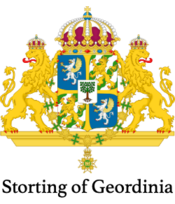Storting of the Kingdom of Geordinia
The Storting is the federal legislature of the Kingdom of Geordinia, established in 1241 by the Constitution of Geordinia. It is located on the Mall in the capital; Portland. The bicameral parliament is comprised of an upper house (The Senate) and a lower house (The House of Representatives. The Senate has 100 members, all independents by law, and the House has 450 members, and is elected every five years based on proportional representation in 450 constituencies.
The Storting passes Acts that apply in Geordinia and the Crown dependencies and overseas territories. The Storting is also responsible for adopting the nation's budgets, approving the nation's accounts, appointing and exercising control of the Government, and taking part in international co-operation. Bills may be initiated by the Government or by members of the House of Representatives. All bills passed must be presented before the Council of State to receive Royal Assent within thirty days in order to become law.
Members of the House of Representatives are called Congressmen/women and must be over the age of 25. Members of the Senate are called Senators and are appointed by the Monarch. Senators only need to be over the age of 18 and serve for life. They must also be a peer of the realm and so must have a noble title, however, in cases where an individual is nominated and doesn't have a peerage, the Sovereign will grant them one. They are appointed by the Monarch upon the advice of an independent commission and serve for life. Only upon the death of a Senator can another be appointed as their is a limit of 100 members. All members of the Senate are required to be independents in terms of political party.
For elections to the House of Representatives, Geordinia is divided into 450 constituencies, each electing a single member to the House of Representatives (Congressman or Congresswoman) by simple plurality. General elections are called by the monarch when the Statsminister so advises. After the Constitutional Ammendment in 1892, the elections are called by the Monarch every five years to occur on October 2nd. However, if a Government fails to defeat a vote of no confidence, the Government is dissolved and if no new Government can be formed, a fresh general election is called. The Statsminister retains their right to advise the Monarch about when to call an election, but this advise may only be given if the Statsminister wishes to call an early election, not if they wish to extend a term.
Leadership
Due to the independent nature of the Senate, it does not have the traditional party leadership make up. Instead, the Senate's leadership consists of the Speaker and their deputies. In the House of Representatives, due to the partisan nature of the lower house, it does have a leadership system but it is a highly unique one. Due to the Speaker being non-partisan, they are not included in the party leadership system. The Speaker is usually from the majority party but they resign their party membership upon assuming the office.
The largest party usually forms the government so is simply called 'His Majesty's Government' and has the following leadership in descending order of precedence:
1. The Statsminister
2. The Majority Leader
3. Government Chief Whip
4. Government Deputy Chief Whip
5. Government Whips
The second largest party is usually the opposition party and is called 'His Majesty's Most Loyal Opposition' and has the following leadership in descending order of precedence:
1. The Leader of the Opposition
2. The Minority Leader
3. Opposition Chief Whip
5. Opposition Deputy Chief Whip
6. Opposition Whips
Other smaller parties follow a similar format but with fewer positions:
1. Leader of the [party name]
2. Chief Whip of the [party name]
3. Deputy Chief Whip of the [party name]
All of the above positions get an additional salary. Smaller parties can have additional whips but they do not receive an additional salary.
The Majority and Minority leaders are tasked with organising their Leader's political agendas in the House of Representatives. Whilst the Majority Leader is the 2nd in command for the Statsminister in the House of Representatives, they are often not the 2nd in command of the executive federal government due to most Statsministers separating their cabinets from their House of Representatives leadership. The Majority and Minority Leaders are purely House of Representative roles and do not get involved with the running of the government or opposition, but simply try to get the Government/opposition agenda through the House of Representatives. The Majority Leader will often be granted cabinet status so that they can sit in on cabinet meetings so that the government's agenda can be more efficiently organised in the House of Representatives. Whips have never been given cabinet status.
Natalia Vetlesen
Harald Stordahl
Vishak Thorstad
Oliver Velde
Sebastian Kristiansen
Harald Stordahl
Harald Stordahl






